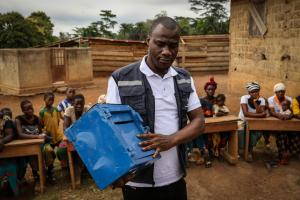Preventing sexual abuse and exploitation in Guinea
N’zerekore – In the small village of Sinkolé in the densely-forested south-east of Guinea, scores of men and women gather outside a ramshackle community hall on a Friday morning. Marius Djo, a World Health Organization (WHO) advisor on Prevention of Sexual Abuse and Exploitation (PSEA), waits for everyone to take a seat on old wooden school benches arranged in a rough semi-circle, then he begins an animated introduction.
“During an epidemic such as Ebola, people put an enormous amount of trust in humanitarian organizations,” says Djo. “If this trust is broken through sexual abuse and exploitation, it not only causes further harm to already vulnerable populations, but it can also create barriers and ultimately hinder our ability to help. We cannot allow that to happen.”
“The best way for us to ensure that this does not happen here is for us to work together with you,” he says.
Working closely with communities in N’zerekore region of Guinea, the epicentre of an Ebola epidemic that began in the country on 14 February 2021, is an integral part of ongoing efforts by WHO and other United Nations agencies to better safeguard vulnerable populations against sexual abuse and exploitation.
In addition to raising awareness of these issues through on-the-ground outreach and the dissemination of information materials, WHO has also begun to implement mechanisms including anonymous complaint boxes and designated community focal points for preventing sexual exploitation and abuse. In the coming months, the aim is for these mechanisms to be rolled out across each of the five localities that are currently covered by WHO in the region. The organization also plans to initiate a national hotline to report abuses.
“We didn’t know a lot about these kinds of issues and even if they’d been happening before I don’t think a lot of women would have had either the courage or the knowledge to report them,” says Guelo Kolomou a 25-year-old resident of Sinkolé. “We are very happy to have been included in this new process and we hope that this is just the beginning and that we can continue to feel more empowered,” she adds.
Harmonizing approaches
WHO and partners have also sought to scale up the training of those dealing directly with communities, including both their own employees and those of 17 other local and international NGOs.
Since the start of the current Ebola epidemic, 326 people working on the ground in N’zerekore, including 49 WHO staff, have received in-depth training in preventing sexual abuse, in addition to the obligatory initial briefings and online course modules that now precede any United Nations deployment. In early May, 17 representatives from organizations including the International Federation of Red Cross and local NGOs such as the Guinean Association for Family Wellbeing (AGBF) also underwent a two-day training on the harmonization of community-based complaint mechanisms, facilitated by Djo.
“We learnt a lot of new things during the training,” says Mamé Kelebi, a midwife who works for AGBF. “As part of my work, I am often working with young women and girls, some of whom have been sexually assaulted or raped and who come to us for support. If they wanted to report any kind of sexual exploitation or abuse by someone in the humanitarian sector, I would now be much better equipped to deal with this.”
“It was my first time doing these sorts of trainings and there were a lot of things I didn’t know before,” says Alpha Dienge, a supervisor at the Guinean organization Enfants du Globe. “It will definitely have a positive influence on our work on the ground and in potentially dealing with any colleagues who might be named by complainants. We know now how to avoid becoming complicit either through silence or ignorance.”
In mid-May, WHO also conducted a training with a further 20 people from various NGOs and state organs that deal specifically with the case management of survivors of sexual abuse or exploitation, including police officers, magistrates and medical doctors.
Wider efforts
Such efforts in Guinea are being mirrored more widely across in other countries in Africa. In the Democratic Republic of the Congo, WHO and partners have conducted awareness campaigns targeting a range of civil society actors and government personnel, as well as local NGOs. Collectively in Democratic Republic of the Congo and Guinea, some 40 leaders of women’s associations have been briefed on preventing sexual exploitation and abuse mechanisms and protocols. A joint inter-agency task force has also been initiated in both countries to mutualize efforts and streamline information sharing.
Back in Sinkolé, after the various new mechanisms have been carefully explained and discussed, a local focal point elected, and three complaint boxes put up around the village, the residents gradually disperse. A number of them continue to pore over information pamphlets as they walk away.
“WHO accords a central place to preventing sexual exploitation and abuse alongside other pillars of the response to health emergencies,” says Dr Georges Ki-Zerbo, WHO Representative in Guinea. “Our approach to the issue also places particular emphasis on vulnerable people, including Ebola survivors.”



